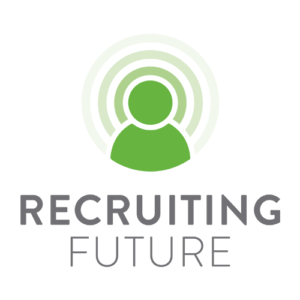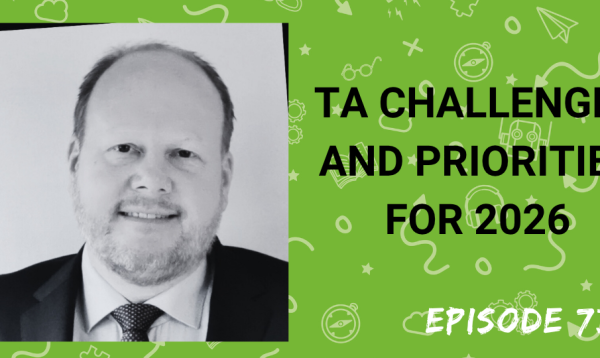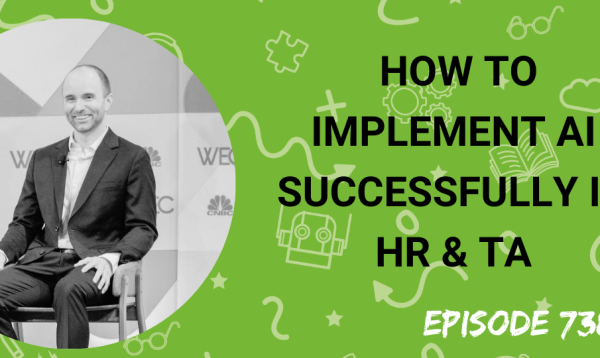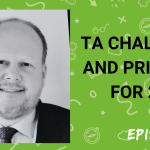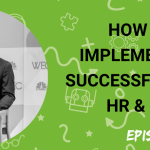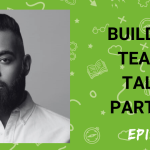I’m just back from The HR Technology Conference in Las Vegas which was, as ever, full of interesting insights. I’ll be sharing an interview I recorded while I was there on next week’s show. On this week’s show, I wanted to follow up on some of the topics raised during my discussion with Elaine Orler in Episode 106 and do a deeper dive into the candidate experience.
My guest this week is self-confessed candidate experience fanatic Alan Walker. Alan is co-founder of The Talent Finders and is also a former in house recruitment leader. He is the perfect person to provide a practitioner’s eye view of the issues surrounding the quest for the perfect candidate experience.
In the interview we discuss:
• Why Alan is so passionate about the candidate experience
• The long terms benefits of providing a quality candidate experience
• Why there is so much talk and so little action on this topic
• What companies can do to fix their candidate experience
• The importance of data throughout the process
Alan also tells us which employers he thinks are doing candidate experience well and shares some of the secrets behind his success with content on LinkedIn.
Subscribe to this podcast in iTunes
Transcript:
Matt Alder [00:00:00]:
Just before we start this week’s show, I’m excited to tell you about series two of Career Life Stories. If you’ve not seen these video interviews before, they tell real stories about people, their lives and their work. Series two hits the Internet in November and features interviews with Jerry Crispin from Career Crossroads, Johnny Campbell from Social Talent, Tony Baish from Stryker, and me. Here’s the trailer. When I was younger, I always thought, I want to have a job with a briefcase.
Trailer [00:00:37]:
Distinctly remember saying, I’m never going to work in an office behind a desk. I’m going to work outdoors. Didn’t quite turn out that way.
Trailer [00:00:46]:
I was incredibly shy, like, painfully shy. So obviously I started doing drama. So was there an element of rebelling against the authority you’d had?
Trailer [00:01:02]:
Without a doubt. Without a doubt.
Trailer [00:01:05]:
What was growing up like, my teachers hated me.
Trailer [00:01:11]:
This is hard to admit, but I literally, literally cut classes every day for an entire year.
Trailer [00:01:17]:
And in my very last week of high school, I was involved in a serious car accident. And that really changed the trajectory of my career.
Trailer [00:01:27]:
I loved the fact that it was us against the world. I kind of felt my career had really started at that point.
Trailer [00:01:36]:
Your.
Trailer [00:01:37]:
Your hat. My hat. Was that intentional?
Trailer [00:01:43]:
I was clueless about what it really would take for me to get another job.
Trailer [00:01:50]:
Within a couple of months, we were facing a crisis. All the money we invested was gone, and we had to figure out a way to survive.
Trailer [00:01:56]:
I honestly, I remember at that time thinking, gosh, like, I, am I even going to make it out of this? And do I even care?
Trailer [00:02:02]:
I softened for the right reasons. And I kind of learned that there’s more to life.
Trailer [00:02:06]:
She was a phenomenal, phenomenal person.
Trailer [00:02:09]:
A lot of the things that have held me back at various points in my life and my career are of my own making. Tell me about the time you asked to write your own obituary. My life has always got better when I’ve done things that are outside my. Outside my comfort zone. You have to take more responsibility for what it is you do and do that really well.
Trailer [00:02:34]:
Defining success is the most important thing to being successful.
Trailer [00:02:39]:
You have to kind of have that courage, have that belief, have that confidence that you can do it.
Trailer [00:02:45]:
You know, once people are gone, they’re gone. Somebody goes, what the hell happened to that guy with the hat?
Matt Alder [00:02:59]:
Career Life Stories is produced by Working Films. To find out more and to sign up for Updates, go to careerlife stories.com that’s careerlife stories.com.
Matt Alder [00:03:29]:
Hi everyone, this is Matt Alder. Welcome to episode 107 of the Recruiting Future podcast. I’m just back from last week’s HR Technology conference in Las Vegas which was full of excellent insights. I’ll be sharing an interview I recorded while I was out there on next week’s show. On this week’s show I wanted to follow up on some of the topics raised during my discussion with Elaine auler in episode 106 and do a much deeper dive into the candidate experience. My guest this week is self confessed candidate experience fanatic, Alan Walker. Alan is co founder of the Talent Finders and is also a former in house recruitment leader. He’s the perfect person to give a practitioner’s eye view of the issues surrounding the quest for the perfect candidate experience. Hi Alan and welcome to the podcast.
Alan Walker [00:04:25]:
Hi Matt, nice to meet you.
Matt Alder [00:04:27]:
So could you introduce yourself and tell everyone a little bit about who you are and what you do?
Alan Walker [00:04:33]:
Of course I can, yeah. So I’m Alan Walker, I’m a co founder of the Talent Finders and we like to describe ourselves as an innovative talent solutions provider and hopefully the, the businesses we work with will agree. Basically we like solving a whole raft of interesting talent related problems for our clients and they range from big boys, big corporates, through tech, nimble startups and everything in between really. And prior to the Talent Finders which is all of a year and two months old, I had a 14 year career in recruitment starting out on the agency side and more recently on the in house recruitment side with organizations like Pearson.
Matt Alder [00:05:11]:
Fantastic. So I have sort of seen a lot of the stuff that you, that you write online and it’s kind of really clear that you’re very passionate about the candidate experience. Why is that? What sort of drives that passion for you?
Alan Walker [00:05:26]:
Yeah, I think for me it’s. My reasons are threefold and I think firstly probably the most important in my mind is it’s the big softie in me. It’s the right thing to do. I think when someone is searching for a job they’re more often than not putting blood, sweat and tears into their job search and it’s an extremely emotive time for them. And for most people a career move is really important otherwise they wouldn’t be doing it probably has got that emotional attachment and is being done to make positive impact on their lives. And for an employer to not respect that and to offer up very little in the way of engagement or unfortunately as many do, no Engagement at all is entirely the wrong thing to do. But, but secondly, and this is what will appeal to many, it’s the kind of pragmatist in me, companies who actually do deliver a great candidate experiences are really helping their long term hiring efforts. So we’ve done a bit of research around this and it’s shown that an unsuccessful candidate that feels well treated regardless of how far they get in a recruitment process is much more likely to apply for other roles with that company in the future and more likely to talk positively about that organisation to their friends, family, etc. Whereas candidates who don’t feel well treated are clearly far less likely to do so and of course more likely to tell the world about it. So if any company places any emphasis on creating talent pipelines, talent pools, talent communities, whatever they may refer to them as having engaged candidates that have positive feelings about their, their organization, its hiring practices, etc. Is going to be far more productive in the long term. And the last piece, the business person in me, it makes commercial sense as well. So you will have seen the Virgin Media did a really interesting piece of work a couple of years ago with PH Creative and they estimated that the amount of lost revenue from upsetting candidates who is a direct consequence, decided to stop being customers, was worth several million pounds. And the changes they put in place off the back of that not only improved the candidate experience so they didn’t lose as many customers and they improved their ability to hire, but was so good that candidates who were not yet customers decided to become so. So in effect it turned recruitment into a, into a revenue generator and not many recruitment teams can claim that many in house recruitment teams. So for organizations in particular those that are consumer brands, that’s where there is a really direct correlation. Delivering a great candidate experience not only helps on the recruiting front, of course, but also having a positive impact on the bottom line and the perception of their brand as a whole.
Matt Alder [00:08:21]:
Really that all makes, you know, very, very logical, very, very logical sense. And I suppose the question for me, you know, lots of employers, lots of people will always talk about the sort of, the vital, the candidate experience. You can’t go to any kind of event or conference or even turn LinkedIn on without someone saying that it’s an incredibly important thing. If everyone thinks it’s so important, why do so many people get it so wrong? What’s the, what’s the, what’s the kind of, what’s the problem there?
Alan Walker [00:08:52]:
Yeah, I think there’s a bit of the delta between people saying it’s Important and actually thinking it’s important and I want to be kind here. I think often it’s down to people spending their time in the weeds rather than above the canopy looking at the whole forest. So having been a in house recruitment leader, a manager of teams myself, it’s, it’s really easy to get down, bogged down by the metrics that affect the today or the next week, such as time to hire, cost per hire, channel effectiveness, etc. And sometimes measuring things a little bit further beyond that. So like quality of hire, diversity and retention. But rarely do many go beyond that and certainly when they look at candidate satisfaction, they never do it in any real great depth in my mind and often they’ll focus on the candidate that got the job. What was your experience like, Mr. Candidate? We’ve just offered a role to. Oh, it’s brilliant. Kind of obvious they’re going to say that to a certain extent and nor do they look at the direct commercial impact of their work very often, such as how a poor candidate experience might be impacting their company’s bottom line or, or the perception of the brand. So I think yeah, it’s easy to pay lip service to it, but those are actually doing something about it and actually mean what they say. It’s few and far between. It’s changing though, thankfully.
Matt Alder [00:10:14]:
So how can it be fixed? You know, I see lots of people sort of discussing, you know, solutions to candidate experience and you know, very often those discussions just bring up a very, very long list of more problems. So from your, you know, from, from your sort of perspective of, you know, being to now sort of, you know, taking a step back and looking at the bigger picture, what do you think organizations can do to actually fix this problem?
Alan Walker [00:10:40]:
I think that’s, as you said, it’s the kind of million dollar question almost. And I don’t think the answer is going to be the same for every organization at all, far from it. But the starting point for every organization who thinks they’ve got a problem to fix is to actually understand whether they have and do some proper research or discovery stage to figure that out. And they need to get insight and proper valid data from applicants and candidates who’ve been all the way through their recruitment process and to make sure that research is valid. So what I mean by that, it needs to be a truly representative sample and it’s got to include those that may have only got as far as shooting their CV over and applying all the way through to those that receive and accept an offer and everything in between. And your Sample must be representative of the volumes of candidates at each of those stages to truly put your finger on the pulse. And once that’s been done, the next stage has got to be correlating the findings of that research and with the impact they might have on recruiting or commercial outcomes or both. So, as an example, if a percentage of candidates are saying that the assessment part of your hiring process is broken, it’s really unsatisfactory. They didn’t feel it was rigorous or rigid or appropriate, what might that effect be on your organization’s ability to hire them? If they are the preferred candidate, they might just say no or your bottom line. So if they are customers and they think you can’t organise a bun fight in a bakery, they may not want to give you their money anymore. And then of course, you need to get into what it’s going to cost to fix that, if there is a cost associated with it. And clearly I can’t give you that number or any organization that number without knowing them. And it’s going to be different for every organization. But once that’s been figured out, it should be reasonably easy to calculate the return on investment and that any expected improvements might make and then build a business case around it and do what you need to do with the powers that be internally to get the support you need to make those changes.
Matt Alder [00:12:51]:
Who does this? Well, at the moment, because, you know, we’re being a little bit negative and saying that everyone’s got a problem and it’s all really bad and I know that there are some companies out there who’ve kind of been through this process and you know, really focus on giving an excellent candidate experience. Who stands out for you in this space?
Alan Walker [00:13:11]:
Well, I was laughing to myself there. I was so pleased that you actually asked me who does it well rather than and who doesn’t, as I’d have had to plead the fifth Amendment on that one. But thankfully there are some paces out there. There are people who are leading their way in terms of organizations that people will have, will have heard, of course, that Virgin Media, a really high profile, they’ve made some great strides. And other companies I know of, such as Accenture, PepsiCo, Deloitte, some of those big boys have won awards for their candidate experience work recently. But I think that said, winning accolades when you have a big budget to make improvements and the right people in place to shout about it shouldn’t deter other organizations who don’t. I don’t think you need huge budgets to get this stuff right. And some of the very Best candidate experiences I’m hearing about from smaller, less well known organisations who are doing some really interesting and groundbreaking work in this space. And I think the beauty of their situations, the smaller companies, is that they can try stuff, they can make mistakes and try again without that really high risk and they can do it at pace. Whereas those bigger organizations we talked about earlier, the reason they have to spend a lot of money on getting these things right, for obvious reasons, they need to get it right first time.
Matt Alder [00:14:33]:
So literally every week at the moment, it seems like there are several sort of new bits of talent acquisition technology coming onto the market, all promising, you know, all promising to solve various aspects of, you know, talent acquisition, the issues that people have. Can technology help with the candidate experience? Do you think that obviously. Do you think that there’s a, there’s a technical part to the solution to this problem?
Alan Walker [00:15:00]:
I think it can help, but I think technology is only part of the answer. I think there needs to be the right mindset and support from the business in place first and that desire to do better candidate experience and to deliver a more engaging process. But technology can be an enabler, without a doubt. But you’ve got to have the right ethos in place first and the right business reasons for doing it and the right support from leadership. We’re about to add to that piece of technology being released once a week thing ourselves, and we’re working on a bit of tech with a number of companies that are going to, we hope, are going to help organizations deliver that candidate experience piece in a better way. But it’s not going to do it without their input. It’s not going to sit there and happily keep all candidates happy. It needs the company that are using it to have the mindset that they want to deliver that experience. But even, even without that, there’s existing technology around that if used correctly, should be a help rather than a hindrance towards positive candidate experience. They’ve got the data, they know who’s applying. Most companies know where that person is in their application process. They’ve got communication channels because they are already communicating with candidates as they move through. Organizations just need to start using them more effectively. I think there’s a lot of excuses about why they can’t, rather than actually looking at ways they can. And I’m not just talking CRMs or ATS is here, but across the recruitment process, there’s some great examples of technology that are helping organizations deliver far better and more personalized experiences. Things like candidate engagement tools, better assessment technology, of which there’s Some great experience and tech geared up to supporting the onboarding piece as well. Because people assume someone’s accountant, somebody stops being a candidate once they’ve accepted an offer, but actually they’re still a candidate really until they walk through the first door, through the door on the first day and become an employee. So everything that improves that process can help, but you’ve got to have the mindset as an employer that you want it to be a positive experience.
Matt Alder [00:17:17]:
Yeah, I mean, that makes a lot of sense. I think that, you know, you’re right about the candidate experience extending into onboarding and I think that, you know, lots of companies are talking about the employee experience at the moment being very, very important and that obviously starts with recruitment. So, you know, it’s kind of a, it’s kind of a, it should be sort of a seamless thing where, you know, where do you think we’re going with all this in the future? If you had to sort of predict, you know, where we might be in a couple of years, couple of years time, what do you think the landscape would look like?
Alan Walker [00:17:47]:
I think it’s got to improve and it’s going to improve. And I’m feeling a groundswell from both applicants and candidates who I talk to every single day about this stuff, but also from hiring organisations as well, that we seem to be approaching a bit of a time for change for that candidate experience. People are starting to get it now, people are starting to understand the benefits of it. And even if morally, ethically, they don’t care any more than they used to, they’re seeing the commercial and business benefits of getting this stuff right. So with that and that higher level of interest, and also to a certain extent, as more TA leaders are getting a seat at the boardroom table, it’s also peaking the interest of leadership teams who are seeing the bottom line benefits of delivering that great candidate experience. And I think the way I’m seeing the better organizations starting to do it is treating candidates almost like consumers and understanding that you want that consumer to make your ultimate purchase, which is right at the very end of the process. They’re going say yes to an offer. And if you treat them like consumers rather than cattle, they’re much more likely to do that and they’re more likely to come back again and again and again and really get attached and feel passionate about your brand rather than feeling just like a number who’s moved through a machine. And, you know, whether, whether organizations improve their experiences through technology, better processes, good old human interaction, which I think is still highly valuable. It seems that things are moving in the right direction and there’s a general tide moving towards a better experience.
Matt Alder [00:19:24]:
Yeah, absolutely. I completely agree. So, final question, slightly different topic. Anyone who is connected to you on LinkedIn will know that you seem to have this fantastic knack for getting huge amounts of engagement for the stuff that you write on LinkedIn. In fact, there was a, there was a period of time that every time I opened LinkedIn, you were always at the top of my, you were always at the top of my feed. Can you, can you give us, you know, some, some hints of the secret of your LinkedIn engagement success? You know, how you’ve made that happen?
Alan Walker [00:19:59]:
It’s all witchcraft and magic beans, Matt. No, I think joking aside, it’s, it’s interesting this one. It’s, it’s been down to genuine mixture of good luck. I had a few posts that I put out in a row that just seemed to get massive traction and off the back of that increased number of connections and followers etc. That I had. But I think really it was about me starting to take the platform more seriously, both as a business tool, but also as importantly for me, a tool for my own personal learning. And I’ve found that since I’ve applied myself to LinkedIn on actually actively communicating with connections, rather than just being a passive observer who might like the odd thing, I’ve seen a massive upturn in the level of engagement I’m getting and I’m also lucky to a certain extent that I’ve been able to adjust my style. So when I since I launched the Talent Finders when I was an employee, I was always constantly self editing what little contribution I did in fear of upsetting someone or that having an impacts on my employer and my job and all those things. But now being being a co founder of the Talent Finders and therefore my own boss, to a certain extent, it’s allowed me to cast the shackles off, so to speak, and be myself. And funnily enough, my concerns about upsetting people haven’t really manifested themselves well, with the odd exception. But in the main, people seem to react positively to me, thankfully.
Matt Alder [00:21:35]:
Alan, thank you very much for talking to me.
Alan Walker [00:21:37]:
Thank you Matt. It’s been an absolute pleasure. I’ve really enjoyed myself and thanks for listening to the ramblings of a candidate experience fanatic.
Matt Alder [00:21:46]:
My thanks to Alan Walker. You can subscribe to this podcast on itunes, on Stitcher, or via your podcasting app of choice. The show also has its own dedicated app which you can download from your app store. Just search for Recruiting Future. You can find all the past episodes@www.rfpodcast.com on that site. You can also subscribe to the mailing list and find out more about Working with me. Thanks very much for listening. I’ll be back next week and I hope you’ll join me.


